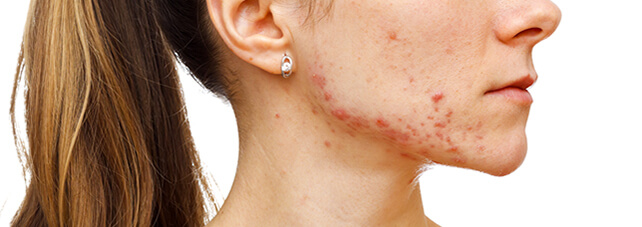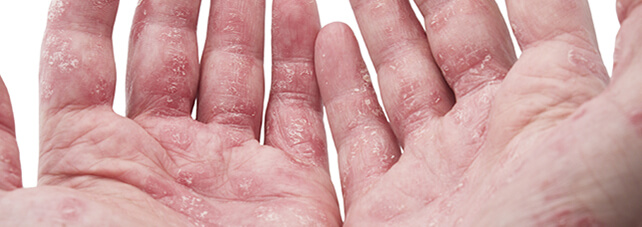Radiant Dermatology Skin Care Services and Treatments
At Radiant Dermatology in Sycamore, we offer a wide variety of skin care services and treatments. From acne care to managing rosacea, our solutions are brought to you by skin care professionals who are dedicated to restoring the health of your skin. Contact us to schedule your appointment today!

Acne Care
Learn MoreMany factors contribute to acne. At Radiant Dermatology, we evaluate the whole patient and develop a plan to treat acne from the inside out. We discuss the role of diet, how hormones can affect your skin, and other contributing factors. We teach you how to cleanse and properly care for your skin, and we provide you with a customized plan to get you the clear skin you desire. Depending on your skin type, we offer Dermalinfusion and Theraclear acne therapy treatments to help reduce acne and keep it from coming back. We also offer a variety of chemical peels to help clear acne faster and treat unwanted scars.
What is Acne?
Acne is the term for plugged pores (blackheads and whiteheads), pimples, and even deeper lumps like cysts or nodules that occur on the face, neck, chest, back, shoulders, and upper arms. Acne is common in teenagers, however, the disease is not restricted to any age group. Adults can get acne, even into their 40s.
While not a life threatening condition, acne can be upsetting and disfiguring. Severe acne can lead to serious and permanent scarring. Even mild acne can leave scars, if left untreated.
Do you want to get rid of your acne?
Schedule a consultation with Dr. Friedrichs to find out what treatments are right for you.

Eczema
Learn MoreThe most important treatments for eczema are proper hydration and care of the skin. At Radiant Dermatology, we realize there is a lot of confusing and conflicting information out there about eczema and the right skin care. We are here to help and guide you on the proper path to clear skin and a better you.
Skin problems are often the first sign that the body is under stress. This stress can be emotional or physical (such as infections or abnormal thyroid function). Dermatologist Amanda Friedrichs helps you uncover potential triggers and leads you in the right direction to decrease or eliminate stressors and ultimately improve your skin.
What is Eczema?
Eczema is a general term encompassing various inflamed skin conditions. One of the most common forms of eczema is atopic dermatitis (or “atopic eczema”). This chronic, recurring, and very itchy rash affects approximately 10-20 percent of the world population at some point during childhood. Fortunately, many children with eczema find that the disease clears and often disappears with age.
In general, atopic dermatitis will come and go, often based on external factors. Although its cause is unknown, the condition appears to be an abnormal response of the body’s immune system. In people with eczema, the inflammatory response to irritating substances overacts, causing itching and scratching. Eczema is not contagious, and like many diseases, currently cannot be cured. However, for most patients, the condition may be managed well with treatment and avoidance of triggers.
Facts About Eczema
- Eczema is most often characterized by dry, red, and extremely itchy patches on the skin
- Eczema is sometimes referred to as “the itch that rashes,” since the itch, when scratched, results in the appearance of the rash
- Eczema can occur on just about any part of the body
- Baby eczema, or eczema in infants, typically occurs on the forehead, cheeks, forearms, legs, scalp, and neck
- In children and adults, eczema typically occurs on the face, neck, and the insides of the elbows, knees, and ankles
- In some people, eczema may “bubble up” and ooze. In others, the condition may appear more scaly, dry, and red. Chronic scratching causes the skin to take on a leathery texture because the skin thickens
Do you want to better manage your eczema?
Schedule a consultation with Dr. Friedrichs!

Freckles
Learn MoreAt Radiant Dermatology, we can help you get rid of those unwanted freckles or sunspots. We provide extensive education on proper skin care, including helping you pick out the right sunscreen for you. We offer at-home treatment, brightening/lightening pads, and creams that will minimize the appearance of sun damage. If you desire quicker results, we offer a variety of chemical peels to lighten these spots.
What are Freckles?
Freckles are clusters of concentrated melanin that are most often visible on people with a fair complexion. A freckle is also called an “ephelis.” Freckles can be found on anyone, no matter the person’s background.
Freckles are predominantly found on the face, although they may appear on any skin exposed to the sun. Freckles are rare on infants, and are common on children before puberty; they are less common on adults.
What Causes Freckles?
Sun exposure triggers the formation of freckles. Exposure to UV radiation activates melanocytes to increase melanin production, which causes freckles to become darker.
If you have lightened your freckles with creams, peels, or lasers, make sure you use sunscreen to avoid reappearance. Freckles do fade with age in some cases.
Freckles are not a skin disorder. People with freckles usually have a lower concentration of photoprotective melanin and are therefore more susceptible to the harmful effects of UV-radiation. Dr. Friedrichs recommends daily sunscreen application of an SPF 30 or higher with a broad spectrum (blocks both UVA and UVB) physical blocking ingredient such as zinc oxide.
Do you want to minimize your freckles?
Contact us for a consultation today!

Psoriasis
Learn MoreThe most important treatments for psoriasis are proper hydration, care of the skin, and eliminating physical and emotional stressors. At Radiant Dermatology, we teach you the best way to care for your unique skin. Dermatology Amanda Friedrichs guides you to uncover potential triggers and decrease stressors. We also offer topical, oral, and injectable treatments for psoriasis, depending on the severity of your condition.
What is Psoriasis?
Psoriasis is an inflammatory skin condition. There are five types, each with unique signs and symptoms. Between 10 and 30 percent of people who develop psoriasis get a related form of arthritis called psoriatic arthritis, which causes inflammation of the joints.
Types of Psoriasis
Plaque psoriasis is the most common type of psoriasis. About 80 percent of people who develop psoriasis have plaque psoriasis, which appears as patches of raised, reddish skin covered by silvery-white scale. These patches, or plaques, frequently form on the elbows, knees, lower back, and scalp. However, the plaques can occur anywhere on the body.
The four other types of psoriasis are:
- Guttate psoriasis, which presents as small red spots on the skin
- Pustular psoriasis, which presents as white pustules surrounded by red skin
- Inverse psoriasis, which presents as smooth, red lesions and form in skin folds
- Erythrodermic psoriasis, which presents as widespread redness and is accompanied by severe itching and pain
Regardless of type, psoriasis usually causes discomfort. The skin often itches, and it may crack and bleed. In severe cases, the itching and discomfort may keep a person awake at night, and the pain can make everyday tasks difficult.
Psoriasis is a chronic condition with no known cure. Controlling the signs and symptoms typically requires lifelong therapy. Treatment depends on the severity and type of psoriasis.
Do you need help managing your psoriasis?
Schedule a consultation with Dr. Friedrichs today!

Rosacea
Learn MoreTreatments for Rosacea
Rosacea is a result of skin inflammation and many different triggers. Dermatologist Amanda Friedrichs takes the time to educate patients about potential triggers and ways to decrease flares or worsening of the condition. At Radiant Dermatology, we offer a variety of topical skin care products to decrease the unwanted and often embarrassing redness of rosacea, so you always look and feel your best.
What is Rosacea?
Rosacea is a chronic skin disease that causes redness and swelling, primarily on the face. Other areas that can be affected are the scalp, neck, ears, chest, and back. Rosacea can even affect the eyes.
Those suffering from rosacea may first notice a tendency to flush or blush easily. The condition can occur over a long period of time and often progresses to a persistent redness, as well as pimples and visible blood vessels in the center of the face that can eventually involve the cheeks, forehead, chin, and nose.
Since rosacea causes facial swelling and redness, it is easily confused with other skin conditions, such as acne and sunburn. For this reason, rosacea is known as the “great pretender,” and can be misdiagnosed as adult acne.
Do you need help managing your rosacea?
Schedule a consultation at Radiant Dermatology to get started!

Skin Cancer
Learn MoreEarly detection is key.
Your first and best defense against skin cancer is to protect yourself with sunscreen. Dr. Friedrichs urges you to apply it every day to exposed areas to guard against the harmful effects of ultraviolet radiation. If skin cancer does develop, it most commonly forms in the epidermis, or the outermost layers of skin, which means a tumor is usually clearly visible. This makes most skin cancers detectable in the early stages.
If you have spots that appear to be changing in shape, size, or color, make an appointment for a skin check with Dr. Friedrichs right away.
Types of Skin Cancer
There are three main types of skin cancer. Each of these three cancers begin in a different type of cell within the skin, and each cancer is named for the type of cell in which it begins. Skin cancers are divided into one of two classes – nonmelanoma skin cancers and melanoma. Melanoma is the deadliest form of skin cancer.
Basal Cell Carcinoma (BCC)
The most common cancer in humans, basal cell carcinoma develops in more than 1 million people every year in the United States alone. About 80 percent of all skin cancers are BCC. BCC can take several forms:
- A shiny, translucent or pearly nodule
- A sore that continuously heals and then re-opens
- A pink, slightly elevated growth
- Reddish, irritated patches of skin
- A waxy scar
Most BCCs appear on skin with a history of exposure to the sun, such as the face, ears, scalp, and upper trunk. While these tumors very rarely metastasize, Dr. Friedrichs encourages early diagnosis and treatment to prevent extensive damage to surrounding tissue.
Squamous Cell Carcinoma (SCC)
About 16 percent of diagnosed skin cancers are squamous cell carcinoma. About 200,000 cases are diagnosed every year. SCC tends to develop in fair-skinned, middle-aged and elderly people who have had long-term sun exposure. It most often appears as a crusted or scaly area of skin with a red, inflamed base that resembles a growing tumor, non-healing ulcer, or crusted-over patch of skin.
While post commonly found on sun-exposed areas of the body, it can develop anywhere, including the inside of the mouth and the genitalia. SCC requires early treatment to keep it from spreading.
Melanoma
Accounting for about 4 percent of all diagnosed skin cancers, melanoma is the most lethal form of skin cancer because it can rapid spread to the lymph system and internal organs. In the United States alone, approximately one person dies from melanoma every hour. Older Caucasian men have the highest mortality rate.
With early detection and proper treatment, however, the cure rate for melanoma is about 95 percent. Once it spreads, unfortunately the prognosis is much worse. Come in for a skin check with Dr. Friedrichs to better understand what your moles look like so you can detect changes to existing moles and spot new moles.
Do you want to minimize your risk for skin cancer?
Contact us to schedule a consultation with Dr. Friedrichs today!

Warts
Learn MoreWarts can be persistent and very difficult to treat. Dermatologist Amanda Friedrichs understands that the quickest and most effective way to get rid of warts is an in-office treatment followed by a customized at-home treatment regimen. At Radiant Dermatology, we offer liquid nitrogen (freezing), immunotherapy (Candid/tricophyton injections) and cantharadin for our in-office procedures.
What is a Wart?
Warts are benign tumors that commonly involve the skin and other epithelial tissues. Warts are caused by a class of double-stranded DNA viruses called papillomaviruses (HPV). Warts are generally classified by their clinical features and morphology (e.g. common, flat, filiform), or by where they are located (e.g. genital, plantar, respiratory papillomatosis).
Do you want to get rid of your warts?
Schedule a consultation with Dr. Friedrichs to find out what treatments are right for you.

